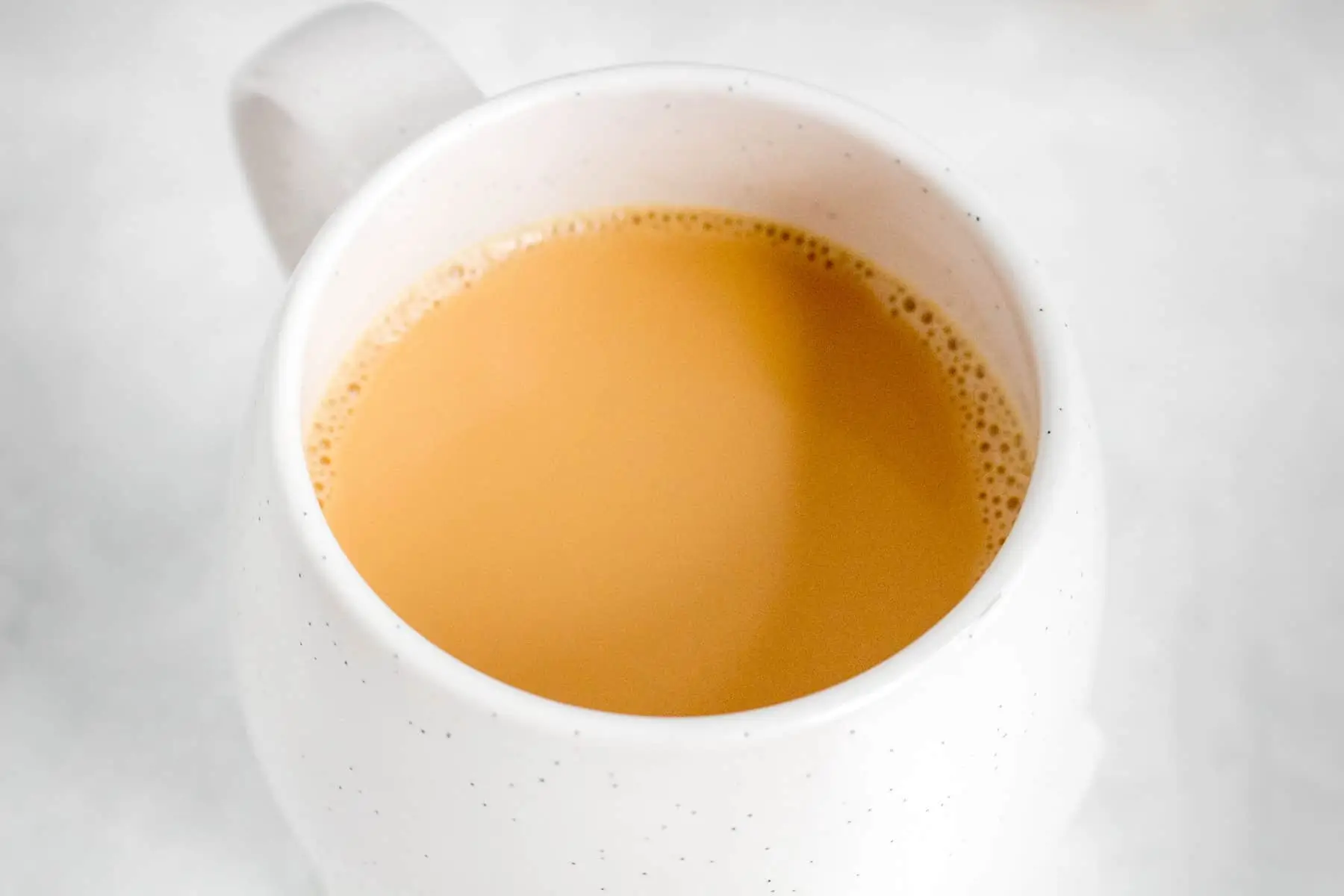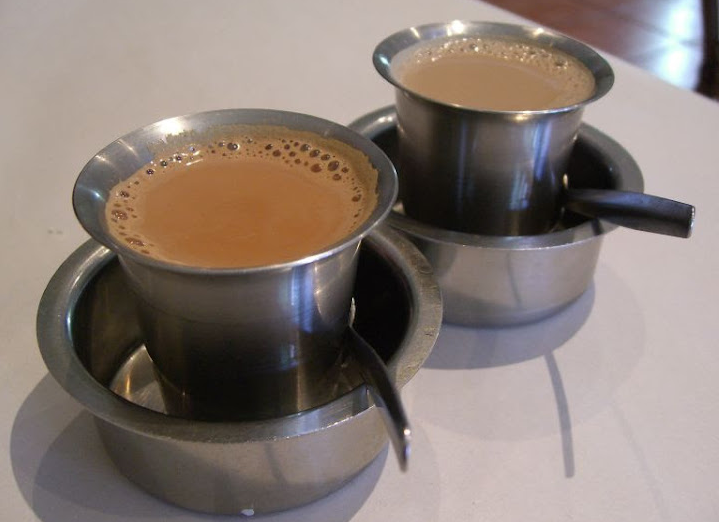Sipping on a warm cup of Assam Milk Tea is like being enveloped in a cozy embrace. This rich and creamy beverage, hailing from the tea-growing regions of Assam in northeastern India, has captured the hearts of tea lovers worldwide with its comforting and indulgent flavor.
In this article, I’ll take you on a journey through the world of Assam Milk Tea, exploring its origins, ingredients, preparation methods, potential health benefits, and even addressing any potential side effects.
So, let’s dive in and unravel the mysteries of this malty delight!
The Origins of Assam Milk Tea
Assam, a state nestled in the heart of northeastern India, is renowned for its tea production. This region contributes nearly half of India’s total tea output, and it’s here that the robust Assam black tea variety thrives.

With its full-bodied flavor and malty undertones, Assam black tea has long been a favorite among tea connoisseurs.
The idea of combining this bold tea with milk and sweeteners emerged as a way to create a rich and indulgent beverage that could be savored throughout the day.
Assam Milk Tea, also known as Assam Black Milk Tea, quickly became a beloved staple in households across the region, and its popularity soon spread far beyond the borders of Assam.
Assam Black Tea: The Bold Base
At the heart of Assam Milk Tea lies the robust Assam black tea. This variety is cultivated in the fertile valleys and rolling hills of Assam, where the unique terroir and climate contribute to its distinctive character.
Assam black tea undergoes a full oxidation process, which gives it a deep, rich color and a robust, malty flavor profile. Unlike some other black teas, Assam tea is less astringent and possesses a natural sweetness that complements the addition of milk and sweeteners.

The strength and bold flavors of Assam black tea make it an ideal base for milk tea, as it can hold its own against the creaminess of milk without becoming overpowered or diluted.
The Creamy Companion: Milk
While Assam black tea provides the backbone of this beloved beverage, the addition of milk is what truly transforms it into a creamy and indulgent delight.
Traditionally, whole milk or sweetened condensed milk is used in the preparation of Assam Milk Tea, lending it a velvety texture and a touch of sweetness.
For those with lactose intolerance or dietary preferences, plant-based milk alternatives like almond milk, soy milk, or coconut milk can be used as a substitute for dairy milk.
The milk mellows the boldness of the tea, creating a harmonious balance of flavors. The malty notes of Assam tea mingle with the richness of the milk, resulting in a soothing and comforting beverage that can be enjoyed at any time of day.
How to Make Strawberry Green Tea?
How to Make Assam Milk Tea: Easy Recipe
Now that we’ve explored the key ingredients, let’s dive into the art of preparing the perfect cup of Assam Milk Tea.

Here’s a simple recipe that you can easily follow at home:
Ingredients
- 1 cup water
- 2 teaspoons Assam black tea leaves (or 1 tea bag)
- 2-3 tablespoons sweetened condensed milk (adjust to taste)
- Sugar, honey, or jaggery (optional, for additional sweetness)
- Spices like cardamom, ginger, or cloves (optional, for added flavor)
Instructions
- Bring the water to a gentle boil in a small saucepan.
- Add the Assam black tea leaves (or tea bag) and let it steep for 4-5 minutes. This allows the tea to fully release its rich flavors.
- Remove the tea leaves (or tea bag) and add the sweetened condensed milk to the saucepan. Stir well to combine.

Image Credit: Kiss 100 - If you prefer a sweeter taste, you can add sugar, honey, or jaggery (a traditional Indian sweetener) to the mixture at this point.
- For an extra layer of flavor, you can add a few crushed cardamom pods, a slice of ginger, or a pinch of cloves to the mixture.
- Pour the hot Assam Milk Tea through a fine-mesh strainer directly into your favorite cup or mug.
- Enjoy the rich, creamy, and malty goodness of your homemade Assam Milk Tea!
Feel free to experiment with the ratios of tea, milk, and sweeteners to find your perfect balance of flavors. Some tea enthusiasts even like to add a touch of spice, such as cardamom or cinnamon, to enhance the aroma and complexity of their Assam Milk Tea.
Potential Health Benefits of Assam Milk Tea
While indulging in Assam Milk Tea is primarily a treat for the taste buds, there are also potential health benefits associated with this beloved beverage. Let’s explore some of them:
- Rich in Antioxidants: Assam black tea is a rich source of antioxidants, including polyphenols and flavonoids. These compounds may help protect against oxidative stress and potentially reduce the risk of certain chronic diseases.
- May Support Heart Health: Ongoing research suggests that the antioxidants found in black tea, including Assam tea, may have a positive impact on cardiovascular health by improving cholesterol levels and reducing inflammation. However, more studies are needed to confirm these potential benefits.
- Potential Cognitive Benefits: Some preliminary studies indicate that the compounds found in black tea may have neuroprotective effects and could potentially support brain health and cognitive function. However, further research is required to establish a clear link.
- Digestive Support: While the evidence is inconclusive, some research suggests that black tea may aid in digestion and help alleviate digestive issues like bloating and indigestion. However, more studies are needed to confirm these potential benefits.
It’s important to note that while these potential benefits are promising, moderation is key when consuming Assam Milk Tea, as it does contain caffeine and added sugars from the milk and sweeteners.
Addressing Potential Side Effects
Like any caffeinated beverage, Assam Milk Tea should be consumed in moderation, especially if you have certain dietary restrictions or health conditions.
Here are some potential side effects to be aware of:
- Caffeine Sensitivity: Assam black tea contains a significant amount of caffeine, which can cause jitters, anxiety, or sleep disturbances in individuals who are sensitive to caffeine.
- Lactose Intolerance: If you have lactose intolerance or a dairy allergy, consuming Assam Milk Tea made with regular milk may cause digestive discomfort or other adverse reactions.
- Added Sugar Concerns: While sweetened condensed milk adds to the rich flavor of Assam Milk Tea, it also contributes a significant amount of added sugars, which can be detrimental if consumed in excess.
- Tannin Sensitivity: Some individuals may experience an upset stomach or digestive issues due to the tannins present in black teas like Assam tea.
If you have any concerns or pre-existing health conditions, it’s always best to consult with a healthcare professional before incorporating Assam Milk Tea into your diet.
Conclusion
Assam Milk Tea is a true celebration of flavors, blending the bold and malty richness of Assam black tea with the creamy indulgence of milk.
This beloved beverage offers a comforting and satisfying sip that can be enjoyed at any time of day.
Whether you’re a tea enthusiast seeking a new and exciting flavor experience or simply looking for a cozy and indulgent treat, Assam Milk Tea is sure to delight your taste buds.
With its potential health benefits and easy preparation, this beverage is a delightful addition to any tea lover’s repertoire.
